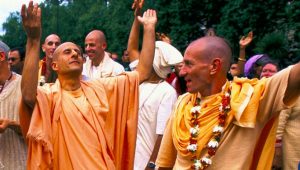By Brian Birmingham
The International Society for Krishna Consciousness (also known as ISKCON, or colloquially as “the Hare Krishnas”) was founded in New York City in 1966, by A.C. Bhaktivedanta Swami Prabhupada. In its heyday in the late 1960s and early 1970s, ISKCON was one of the most recognized new religious movements introduced to the United States. ISKCON enjoyed some positive attention in the media. George Harrison of the Beatles was one of the most noteworthy of the celebrities who helped to promote ISKCON.
History of scandal
As it grew in the US, ISKCON became increasingly controversial and was one of most notorious groups called “cults” drawing increasing attention based upon the behavior of its leadership and devotees. At times families tried to rescue their loved ones through interventions with cult deprogrammers.

ISKCON devotees
ISKCON was likewise plagued by scandal. This included its most influential leader in the 1980s. Ultimately that leader Swami Bhaktipada (aka Keith Gordon Ham) was criminally charged. Ham was one of the first Hare Krishna disciples in the United States and he ruled over the largest Hare Krishna community in the country near Moundsville, West Virginia. Ham eventually pleaded guilty to racketeering, fraud and conspiracy to commit murder. But he ended up only serving 8 years in prison.
ISKCON moved on to more scandal, which involved child abuse that took place within ISKCON boarding schools in the United States and India.
The reportedly horrific physicals and sexual abuse began in the 1970s and continued through the 1980s. A class-action lawsuit was filed in Dallas, Texas on behalf of the victims in 2001. ISKCON subsequently sought refuge in Federal Bankruptcy Court, which ultimately forced the adult children to accept a greatly reduced settlement.
ISKCON claimed it would implement sweeping changes to ensure that no such abuse would ever occur again.
Changes
One of the most important changes is that ISKCON temples became independent and autonomous legal entities. This insulated ISKCON regarding legal liability. So certain temples today are not officially “ISKCON” temples, but rather only ISKCON-affiliated. Under this arrangement, if a temple is sued for misconduct or abuse, the larger organization ISKCON itself theoretically cannot be held liable, leaving liable only the local temple and its leadership.
In Dallas, Texas the local leadership does business as the “Texas Krishnas, Inc.” This supposedly means that Dallas temple is wholly independent and not an ISKCON temple at all.
ISKCON has made a tremendous effort at public relations to burnish its tainted image. In the past twenty years, the organization has become adept at PR. Anuttama das, is now ISKCON’s “Minister of Communications” and he has done his best to soften the media perception of ISKCON and persuade the general public that ISKCON has changed, and for the better.
ISKCON has apparently curtailed most of its questionable activities.
But has it essentially changed, at least at the local level in Dallas, Texas?
Recent events prove that the answer to this question is “no.”
Abuse in Dallas
It has come to light the families of several students in the Dallas Hare Krishna school were interviewed by ISKCON’s “Child Protection Office,” which revealed that their children were being abused by a certain teacher there.

Dallas Krishna temple
Investigation
Quotes from an ISKCON mother’s Facebook page as follows:
“The ISKCON Child Protection Office investigated this abusive teacher, and found her guilty of child abuse. She was removed from her position and is not teaching in the school today. However, at every step of the investigation the Dallas temple management, headed by the temple president, blocked the investigation by telling school administrators and others to lie, and by threatening families in various ways. After the Child Protection Office made their decision regarding the abusive teacher, the Dallas temple management further tried to undermine their judgment by threatening legal action against that office, in an effort to have their judgment and decision reversed.”
The only way that this family found resolution in their situation, was to physically move and leave Dallas entirely.
They’d been banned from the Dallas temple, and told that their services at the Dallas temple were no longer required.
Accountability
The leadership of the Dallas Hare Krishna temple is no more accountable or transparent than they were in 1972. And the abuse within the local Hare Krishna school in Dallas is still apparently going on as the hierarchy of this temple chose to side with the teacher, not the students and their families.
Despite all of the public relations efforts of Anuttama das and whatever he might say to sway the media, the Hare Krishnas, at least in Dallas, have not substantially changed, it seems, very much at all.
Note: Brian Birmingham is a graduate of the University of Massachusetts in Boston with a BA in Psychology and Sociology. He is a native of Dallas.




no comment untill now